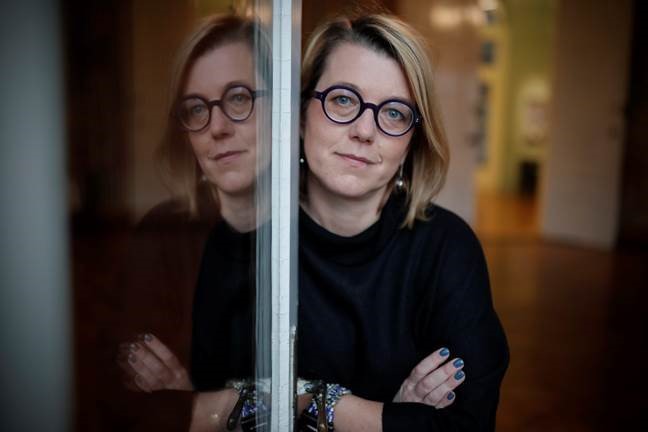Dr. Kaja Širok ist Mitglied des Executive Boards des Internationalen Museumsrats ICOM. Sie promovierte in Kulturgeschichte und forscht zu Geschichte, Museologie, kulturellem Erbe und mündlicher Überlieferung, zu Grenzen und Nationalität sowie zu Formen des kollektiven Gedächtnisses. Sie publiziert in slowenischen und internationalen Fachzeitschriften und ist aktives Mitglied des Akademischen Rates des Hauses der Europäischen Geschichte in Brüssel und seit September 2022 Mitglied des Executive Boards des Internationalen Museumsrates ICOM. Als Assistenzprofessorin für Zeitgeschichte und Erinnerungsforschung lehrt Dr. Širok an der Universität Nova Gorica.
Von 2011 bis 2021 leitete sie das Museum für neuere Geschichte Sloweniens (MNSZS) und wurde 2022 zur Direktorin der Europäischen Kulturhauptstadt Nova Gorica – Gorizia 2025 ernannt. Im selben Jahr wurde sie Staatssekretärin für Kultur im Kabinett des Premierministers der Republik Slowenien, wo sie bis April 2024 tätig war. Sie setzt sich für die Schaffung partizipativer, verantwortungsvoller und integrativer sozialer Umgebungen ein, die der Öffentlichkeit zugutekommen und den Bedürfnissen aller Bürger*innen gerecht werden. Širok begreift Museen als Räume des sozialen Wandels. (Foto: ©Uroš Hočevar)
Dr Kaja Širok has a doctorate in cultural history. She conducts research in the fields of history, museology, cultural heritage and oral tradition, studies on borders and nationality, and studies on collective memory. She publishes in Slovenian and international journals. She is an active member of the Academic Council of the House of European History in Brussels and from September 2022 a member of the Executive Board of the International Council of Museums (ICOM). As an assistant professor of contemporary history and memory research, Dr. Širok teaches at the University of Nova Gorica.
From 2011 to 2021, she headed the National Museum of Contemporary History of Slovenia (MNSZS), and in 2022 she was appointed Director of the European Capital of Culture Nova Gorica – Gorizia 2025. In the same year, she became State Secretary for Culture in the Cabinet of the Prime Minister of the Republic of Slovenia, where she worked until April 2024. She is committed to creating participatory, responsible and inclusive social environments that work for the benefit of the public and for the needs of all citizens. First and foremost, she believes that museums are spaces of social change. (Foto: ©Uroš Hočevar)
Session: Programmatik als Leitlinie. Wie politisch darf es sein? Wie politisch muss es sein?
Input: Die Macht der Museen entfachen: Über Neutralität hinaus zum politischen Akteur des Wandels
Entgegen der Behauptung, Museen seien unpolitisch, handelt es sich bei ihnen tatsächlich um inhärent politische Institutionen, die niemals zu vollständiger Neutralität fähig sind. Eine genaue Betrachtung der modernen Aufgaben von Museen zeigt, dass die Interpretation einzelner Sammlungen in ständigem Dialog mit dem bestimmenden gesellschaftlichen Kontext respektive seinen sich wandelnden Bedürfnissen steht. Heute müssen sich Museen mit komplexen Themen auseinandersetzen; mit Restitution, dem Umgang mit dem Erbe des Kolonialismus und totalitärer Systeme, der Auseinandersetzung mit Verbrechen gegen die Menschlichkeit und der Verantwortung für das kulturelle Erbe in Zeiten bewaffneter Konflikte. Diese aktuellen Herausforderungen unterstreichen die unbestreitbare Tatsache, dass Museen nicht isoliert arbeiten. Sie sind eng mit dem Gefüge der Gesellschaft verbunden und reagieren aktiv auf deren Komplexität. Das wahre Potenzial von Museen liegt in ihrer Fähigkeit, als Akteure des Wandels zu agieren, Verbindungen zu schaffen und Einheit auf der Suche nach vielschichtigen Antworten auf die von der Gesellschaft gestellten Fragen zu fördern.
Unveiling the Power of Museums: Beyond Neutrality to Political Agents of Change
Contrary to the assertion that museums are apolitical, they are in fact inherently political institutions that are never capable of complete neutrality. A close examination of the modern mission of museums shows that the interpretation of individual collections is in constant dialogue with the prevailing social context and its evolving needs. Today, museums must grapple with complex issues such as restitution, dealing with the legacy of colonialism and totalitarian systems, confronting atrocities against humanity and dealing with the responsibility for cultural heritage in times of armed conflict. These ongoing challenges underline the undeniable fact that museums do not operate in isolation. They are closely linked to the fabric of society and actively respond to its complexity. The true potential of museums lies in their ability to act as agents of change, building connections and fostering unity in search of multi-layered answers to the questions posed by society.


